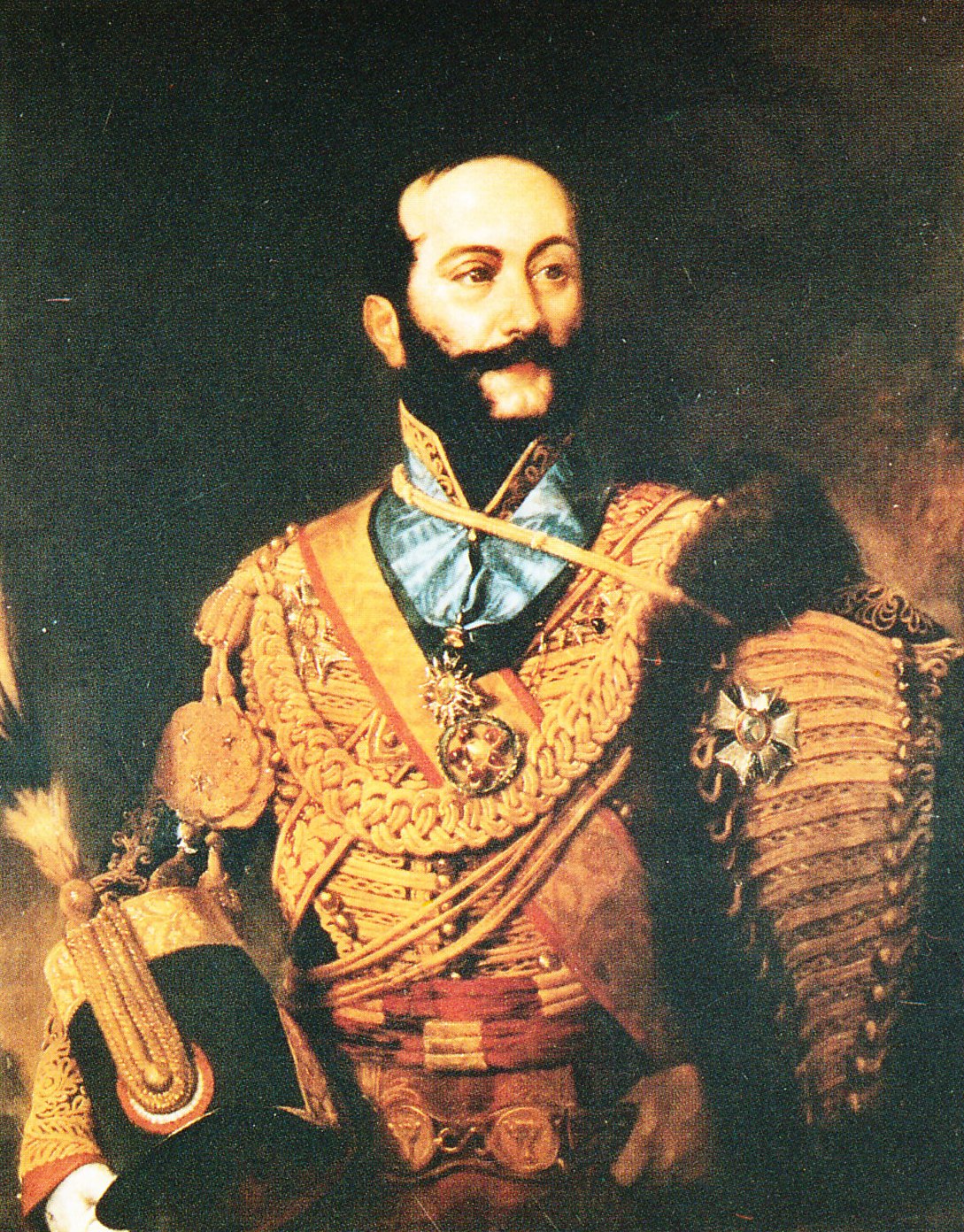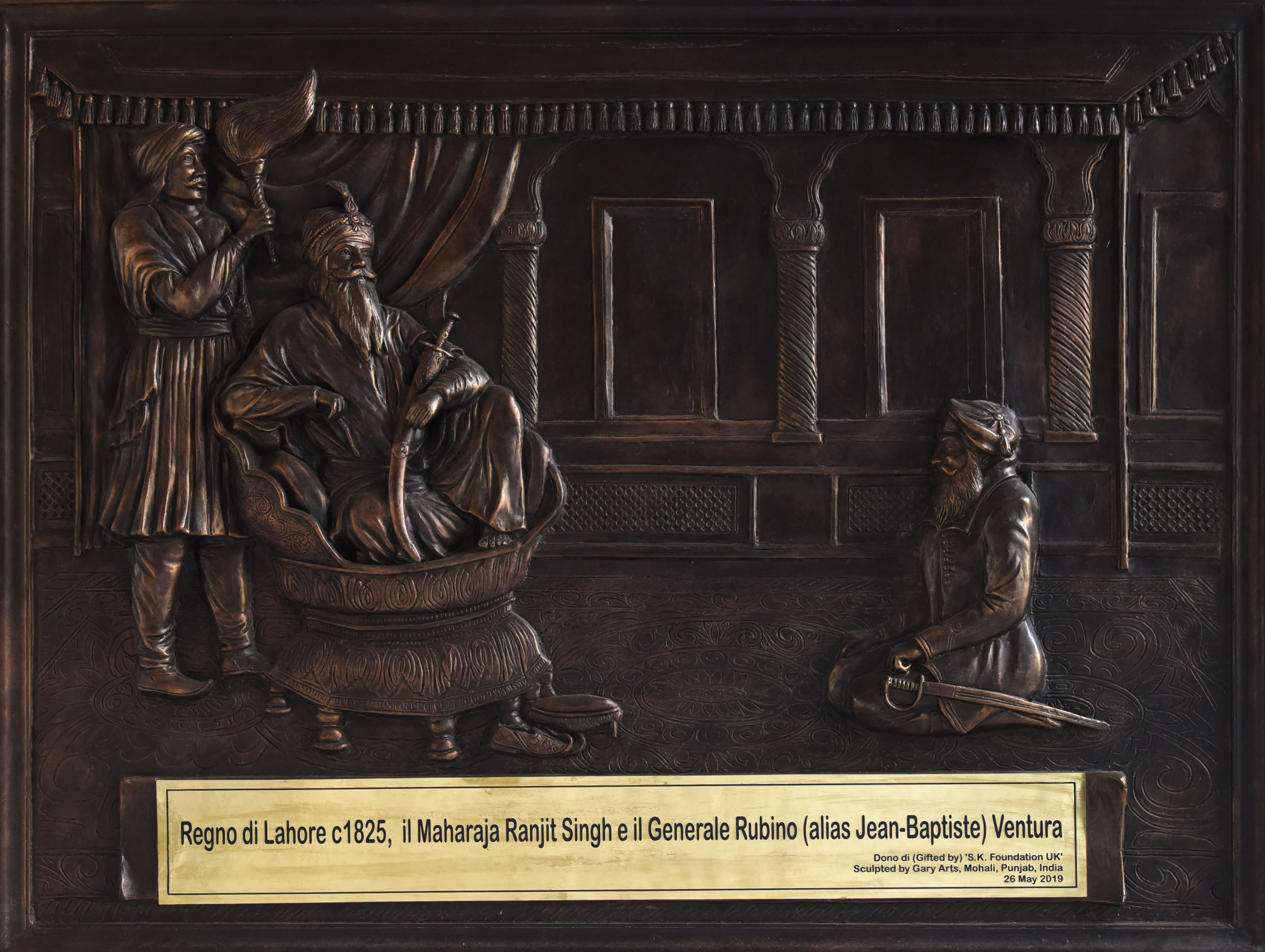Jean-Baptiste Ventura on:
[Wikipedia]
[Google]
[Amazon]
 Jean-Baptiste (Giovanni Battista) Ventura, born Rubino (25 May 1794 – 3 April 1858), was an Italian soldier, mercenary in India, general in Maharaja Ranjit Singh's Sarkar-i-Khalsa, and early archaeologist of the
Jean-Baptiste (Giovanni Battista) Ventura, born Rubino (25 May 1794 – 3 April 1858), was an Italian soldier, mercenary in India, general in Maharaja Ranjit Singh's Sarkar-i-Khalsa, and early archaeologist of the
 He served faithfully under Ranjit Singh and his successors
He served faithfully under Ranjit Singh and his successors
VENTURA, RUBINO on "Jewish Encyclopedia"
/ref> He died on 3 April 1858 in Lardenne, near
 Jean-Baptiste (Giovanni Battista) Ventura, born Rubino (25 May 1794 – 3 April 1858), was an Italian soldier, mercenary in India, general in Maharaja Ranjit Singh's Sarkar-i-Khalsa, and early archaeologist of the
Jean-Baptiste (Giovanni Battista) Ventura, born Rubino (25 May 1794 – 3 April 1858), was an Italian soldier, mercenary in India, general in Maharaja Ranjit Singh's Sarkar-i-Khalsa, and early archaeologist of the Punjab region
Punjab (; Punjabi: پنجاب ; ਪੰਜਾਬ ; ; also romanised as ''Panjāb'' or ''Panj-Āb'') is a geopolitical, cultural, and historical region in South Asia, specifically in the northern part of the Indian subcontinent, comprising a ...
of the Sikh Empire
The Sikh Empire was a state originating in the Indian subcontinent, formed under the leadership of Maharaja Ranjit Singh, who established an empire based in the Punjab. The empire existed from 1799, when Maharaja Ranjit Singh captured Lahor ...
.
Biography
Ventura was born in Finale di Modena (now Finale Emilia) in theDuchy of Modena
A duchy, also called a dukedom, is a medieval country, territory, fief, or domain ruled by a duke or duchess, a ruler hierarchically second to the king or queen in Western European tradition.
There once existed an important difference between ...
to Gavriel Massarani, a Jewish
Jews ( he, יְהוּדִים, , ) or Jewish people are an ethnoreligious group and nation originating from the Israelites Israelite origins and kingdom: "The first act in the long drama of Jewish history is the age of the Israelites""The ...
merchant and Vittoria Massarani, a Catholic. The surname Ventura derives from Buonaventura, Italian for "Mazal Tov", a Hebrew-Sephardic surname originating in Iberia following the expulsion of the Jews in 1492. Ventura received a conventional Jewish education and at the age of seventeen, enrolled as a volunteer in the militia of the Kingdom of Italy
The Kingdom of Italy ( it, Regno d'Italia) was a state that existed from 1861, when Victor Emmanuel II of Sardinia was proclaimed King of Italy, until 1946, when civil discontent led to an institutional referendum to abandon the monarchy and f ...
, later serving with Napoleon
Napoleon Bonaparte ; it, Napoleone Bonaparte, ; co, Napulione Buonaparte. (born Napoleone Buonaparte; 15 August 1769 – 5 May 1821), later known by his regnal name Napoleon I, was a French military commander and political leader who ...
's imperial army in the Queens's Dragons. After the abdication of Napoleon and the dissolution of the Army of Italy in April 1814 he returned to Finale. In 1817, his revolutionary and Napoleonic sympathies became known to the local authorities following a dispute between him and a member of the reactionary Ducal police. As such, he was obliged to leave the country.
In 1817, persecuted by the local authorities for his revolutionary ideas and his sympathies for Napoleon, he had to flee from Finale because of an argument between him and a member of the reactionary police of the Duke of Modena Francesco IV. He went first to Trieste
Trieste ( , ; sl, Trst ; german: Triest ) is a city and seaport in northeastern Italy. It is the capital city, and largest city, of the autonomous region of Friuli Venezia Giulia, one of two autonomous regions which are not subdivided into prov ...
, and then to Constantinople
la, Constantinopolis ota, قسطنطينيه
, alternate_name = Byzantion (earlier Greek name), Nova Roma ("New Rome"), Miklagard/Miklagarth (Old Norse), Tsargrad ( Slavic), Qustantiniya ( Arabic), Basileuousa ("Queen of Cities"), Megalopolis ( ...
, where he was for a time a ship-broker. He changed his name in Jean-Baptiste to hide his Jewish origins.
Having learned that Persia was seeking the services of European soldiers, he obtained a commission as an officer and helped train the Shah's army with European military methods. He soon obtained the rank of colonel in the army of Prince Mohamed Ali Mirza, the Shah's son. Upon the death of the Shah in 1822, Ventura offered his services to his successor, Abbas Mirza
Abbas Mirza ( fa, عباس میرزا; August 26, 1789October 25, 1833) was a Qajar crown prince of Iran. He developed a reputation as a military commander during the Russo-Persian War of 1804–1813 and the Russo-Persian War of 1826–1828, as ...
. In the latter's service, however, were a number of English officers who were decidedly hostile to the French; they considered Ventura to be French because he had fought under Napoleon. As a result of their political intrigues, Ventura was dismissed.
Serving the King of Punjab
He traveled east, ending up in Lahore alongside Jean-François Allard in 1822. They took service with Maharaja Ranjit Singh, King of Punjab, as the Maharaja was encouraging veterans from erstwhile Napoleon's army in his ongoing bid to modernize hisSikh Khalsa Army
The Sikh Khalsa Army (), also known as Khalsaji or simply Sikh Army, was the military force of the Sikh Empire. With its roots in the Khalsa founded by Guru Gobind Singh, the army was later modernised on Franco-British principles by Maharaja Ran ...
in European warfare.
In March of the following year both Allard and Ventura commanded the Maharaja's troops in the Battle of Nowshera
The Battle of Nowshera ( ps, د نوښار جګړه; pa, ਨੌਸ਼ਹਿਰ ਦੀ ਲੜਾਈ) was fought in Nowshera in March 1823 between the Yusufzai Afghans, supported by the Peshawar sardars, alongside Azim Khan Barakzai, the Afgha ...
, where they defeated the Afghan army and captured Peshawar
Peshawar (; ps, پېښور ; hnd, ; ; ur, ) is the sixth most populous city in Pakistan, with a population of over 2.3 million. It is situated in the north-west of the country, close to the International border with Afghanistan. It is ...
. Following a rebellion in Afghanistan, Ventura commanded several difficult campaigns and greatly expanded the boundaries of the kingdom of Punjab.
Along with Jean-Francois Allard, Paolo Avitabile, and Claude Auguste Court, Ventura formed a group of European officers responsible for modernizing the Sikh army and training and commanding the Fauj-i-Khas, the European-model brigade of which Ventura was the commander. Ventura was highly esteemed by the Maharaja, and in addition to the rank of General he was appointed kazi (i.e., Supreme Judge), and Governor of Lahore. He quickly rose through the ranks of the court and became the de facto Commander in Chief of the Darbar forces.
Ventura married in Ludhiana Anna Moses, a lady of Armenian origin by whom he had a daughter Victorine, but he always wanted to return to his country of origin. In 1838 he went on a diplomatic mission to Paris and London, but was called back to Lahore before he had time to visit his family in Italy. An educated and eclectic man, he devoted himself to archeology, and in 1830 he was the first ever to explore a stupa, that of Manikyala, where he recovered numerous coins and relics, some of which are now on display at the British Museum in the King Edward the 7th Gallery. He spent his spare time in Peshawar exhuming Bactrian Greek and Kushan coins from Hindu temples and Buddhist stupas in the Khyber Pass, making numerous excavations then sending the findings on to the Asiatic Society of Bengal in Calcutta.
 He served faithfully under Ranjit Singh and his successors
He served faithfully under Ranjit Singh and his successors Kharak Singh
Kharak Singh (22 February 1801 – 5 November 1840) was the second Maharaja of the Sikh Empire. He was the eldest son of Maharaja Ranjit Singh, founder of the Sikh Empire and his consort, Maharani Datar Kaur. He succeeded his father on 27 June ...
, Nau Nihal Singh
Kunwar Nau Nihal Singh (9 March 1821 – 5 November 1840) was the third Maharaja of the Sikh Empire. He was the only son of Maharaja Kharak Singh and his consort, Maharani Chand Kaur. He was known as Yuvraj Kunwar Nau Nihal Singh. He was also kn ...
, and Sher Singh
Sher Singh (4 December 1807 – 15 September 1843) was the fourth Maharaja of the Sikh Empire. Elder of the twins of Maharaja Ranjit Singh, founder of the Sikh Empire and Maharani Mehtab Kaur. His reign began on 18 January 1840 following his ...
. Upon Maharaja Sher Siṅgh's assassination in September 1843, he left the Punjab.
Later life
In France, he presented King Louis Philippe with a set of ancient Greek coins which he had unearthed. These coins were taken as evidence ofAlexander the Great
Alexander III of Macedon ( grc, Ἀλέξανδρος, Alexandros; 20/21 July 356 BC – 10/11 June 323 BC), commonly known as Alexander the Great, was a king of the ancient Greek kingdom of Macedon. He succeeded his father Philip II to ...
's march through Afghanistan and the Sindh-Punjab region of ancient India.
In his later years he lost a part of his large fortune in unsuccessful commercial enterprises. According to Flaminio Servi, Ventura was baptized toward the end of his life./ref> He died on 3 April 1858 in Lardenne, near
Toulouse, France
Toulouse ( , ; oc, Tolosa ) is the prefecture of the French department of Haute-Garonne and of the larger region of Occitania. The city is on the banks of the River Garonne, from the Mediterranean Sea, from the Atlantic Ocean and from Par ...
.

Awards
He received the FrenchLegion of Honour
The National Order of the Legion of Honour (french: Ordre national de la Légion d'honneur), formerly the Royal Order of the Legion of Honour ('), is the highest French order of merit, both military and civil. Established in 1802 by Napoleon ...
from the king Louis Philippe I in 1835.
A monument donated by the Sikh community was inaugurated on May 26, 2019. It was placed in Via Ventura in Finale Emilia opposite the house in which the General was born. It is a bas-relief which represents Ventura with Maraja Ranjit Singh with dimensions 160x120 cm, sculpted in India.
Notes
Sources
* Balboni, Maria Pia; “Ventura. Dal ghetto del Finale alla corte di Lahore”, Biblioteca Nuova serie, Pagine VIII-212, Aedes Muratoriana, Modena, 1993; * Balboni, Maria Pia, “Il generale Rubino Ventura. La straordinaria vita di un ebreo del Finale al servizio del maharaja Ranjit Singh”, Baraldini editore, Finale Emilia, 2019; * Notizie Storiche e Biografiche del Generale Rubino Ventura, Finalese, Esposte da un Suo Concittadino, Finale (Emilia), 1882; * F. Servi, in Corriere Israelitico, x. 47 et seq.; * idem, in Vessillo Israelitico, xxxi. 308 et seq.; {{DEFAULTSORT:Ventura, Jean-Baptiste 1794 births 1858 deaths Italian Roman Catholics 19th-century Italian Jews Converts to Roman Catholicism from Judaism Mercenaries in India Italian generals Italian soldiers French soldiers People of the First Anglo-Afghan War Jewish military personnel People from Finale Emilia